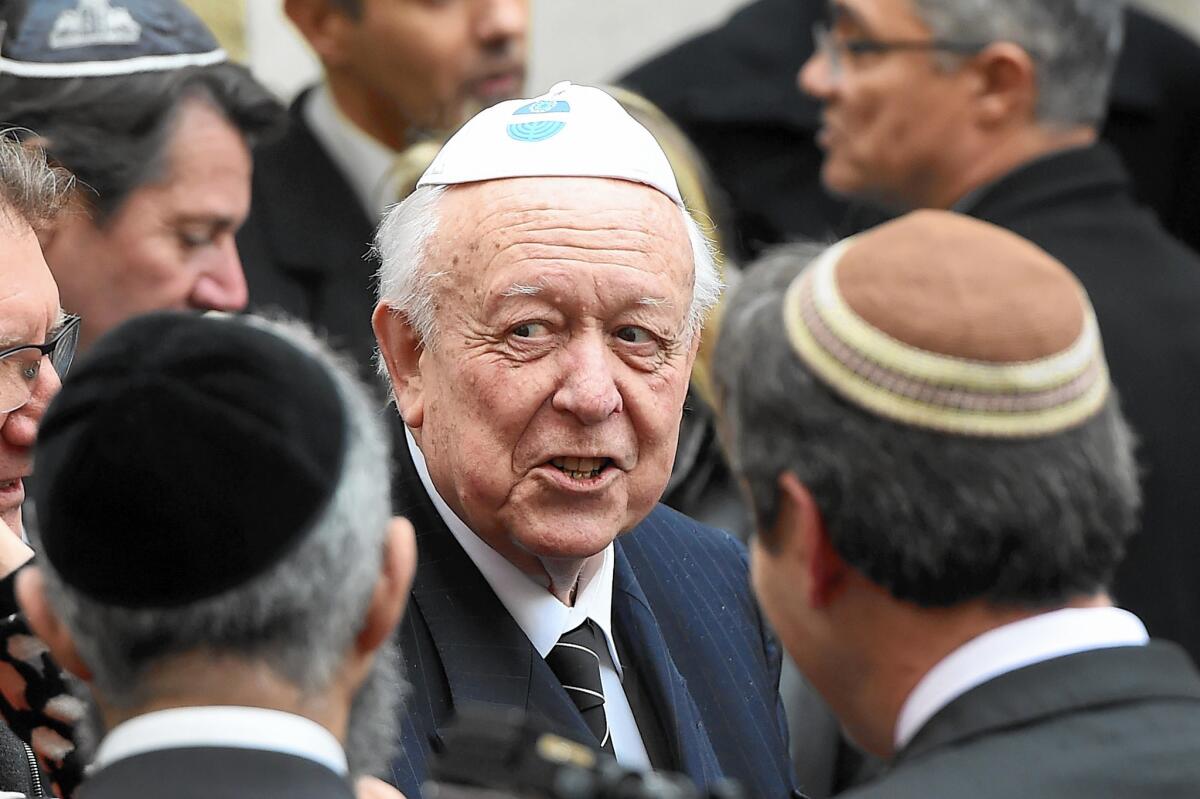France’s Jews advised to leave skullcaps off, for safety

- Share via
Reporting from Paris — The dilemma arose again, this time in Marseille, France, after an attack on a Jewish teacher: Should skullcaps be left at home or worn freely regardless of potential dangers?
The teacher was attacked by a machete-brandishing teenager this week outside the La Source Jewish School in the southern French port of Marseille. The teacher was wearing a skullcap, also known by the Hebrew word kippa and the Yiddish word yarmulke.
French media reported that the 15-year-old attacker told police he regretted not having killed his victim, who was stabbed in the back and hand. The youth, who reportedly cited the Islamic State extremist group while being questioned by police, has been accused of attempted homicide.
After the attack, Zvi Ammar, head of the Israelite Consistory of Marseille, suggested Jews might want to go without the yarmulke “until better days,” while also saying it was the hardest decision he had ever made. The skullcaps are worn in public by Orthodox Jews or during prayer.
But Ammar’s suggestion sparked concern and criticism among Jews and non-Jews.
French President Francois Hollande said he regretted that Jewish people felt they had to conceal or abandon their skullcaps out of fear of attack.
See more of our top stories on Facebook >>
“It is intolerable that in our country citizens should feel so upset and under assault because of their religious choice that they would conclude that they have to hide,” Hollande told the AFP news agency.
Joel Mergui, president of the Central Israelite Consistory of France, rejected the advice to stop wearing yarmulkes.
“If we have to give up wearing all distinctive sign of our identity we have to ask ourselves frankly, what is our future in France?” Mergui told the daily Le Monde newspaper.
France has the world’s third largest Jewish community, which has been targeted in a number of high-profile attacks in recent years.
In January, two days after the attack on the satirical newspaper Charlie Hebdo that left 12 dead, a Frenchman who declared allegiance to Islamic State killed four hostages at a Jewish supermarket in the French capital.
Anti-Semitism is nothing new in France. During the German occupation of the country in World War II, French police were complicit in the arrest of many Jews later sent to the Nazi death camps.
In 1980, the French Israeli Liberal Union synagogue was bombed on the evening of Shabbat and the day of the Sim’hat Torah celebration. The bomb, in the bags of a motorbike parked near the synagogue, killed four — a Portuguese concierge, an Israeli tourist and two French passersby — and injured 46.
Afterward, French prime minister Raymond Barre caused a scandal by declaring the “odious attack intended to hit Israelites going to the synagogue had hit innocent French crossing the road,” inadvertently suggesting only the French were innocent.
Hassan Diab, a Canadian of Lebanese origin, was extradited to France in November 2014 in connection with the bombing.
In November last year, a history professor at another Jewish school in Marseille was injured after being set upon by three men who shouted anti-Semitic insults at him.
According to an opinion poll carried out by the French pollsters IFOP, 47% of Jewish men say they have suffered at least one anti-Semitic attack.
A 2004 law in France bans any “conspicuous” religious symbols in French schools. The law was seen as an attempt to ban the Muslim veil, thus it is widely known as the “headscarf ban,” but in principle it also covers the yarmulkes, large crosses, turbans and other faith symbols.
France’s chief rabbi, Haim Korsia, reportedly said that asking people to stop wearing skullcaps projected part of the responsibility for attacks on the victims.
“What is the limit? … Someone who walks in the street on Saturday morning on his way to the synagogue, isn’t it too visibly Jewish?” Korsia said, according to the Associated Press. “It doesn’t end. And then, some people won’t be allowed to wear a [Christian] cross in the street, to wear such or such religious sign? At some point, we have to defend the model of our society and it is a society of secularism and freedom of religious practice.”
Willsher is a special correspondent.
ALSO
Stan Kroenke introduces himself to L.A. Rams fans
At a Montana restaurant, talk about illegal immigration spills a revelation
Wal-Mart to close 269 stores, including 154 in the U.S. and 9 in California
More to Read
Sign up for Essential California
The most important California stories and recommendations in your inbox every morning.
You may occasionally receive promotional content from the Los Angeles Times.










